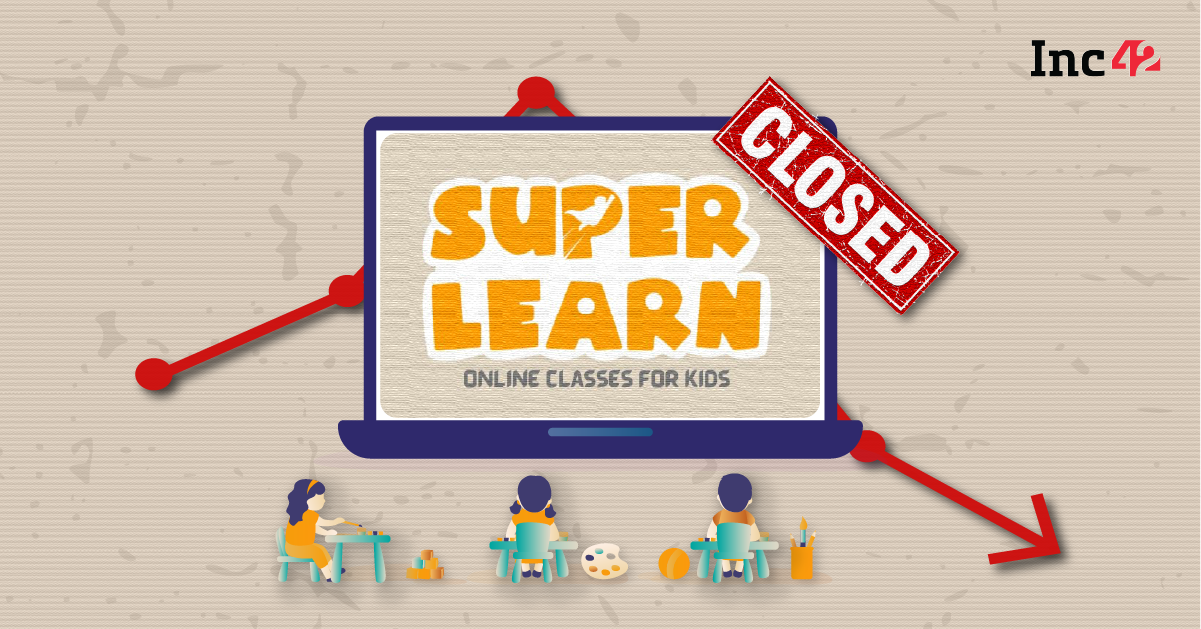SuperLearn shut its operations earlier this year and aims to return the money left to its investors
No one seemed to be buying the edtech story anymore, it was clear the party was ending, cofounder Kunal Bhatia wrote
SuperLearn, founded in 2020, had raised $300K from Incubate Fund and five angel investors
The last 2-3 years have been nothing short of a rollercoaster ride for the Indian edtech players. After seeing a big rise in user base and funding boom in 2020 and 2021, mainly led by the Covid-19 pandemic, the tables have turned for the edtech ecosystem in the country in 2022 and the sector is seeing a slowdown. Shortly after edtech player Udayy shut operations and Lido Learning being on the verge of shutdown, another edtech startup – SuperLearn – has shut shop.
SuperLearn cofounder Kunal Bhatia shared on LinkedIn that a lack of funds and diminishing investor interest, along with the reopening of schools, led the startup to shut its operations earlier this year.
SuperLearn, founded by Bhatia and Ricky Gupta in 2020, was a webinar-style online learning platform for kids aged 3-13 to teach extracurricular and everyday life skills such as personal finance, foreign languages, yoga & exercise, art & craft, dance, abacus & vedic maths, among others.
However, barely two years into operations, the Bengaluru-based edtech startup shut its operations. Bhatia said that with only a few months of runway left to even figure out a pivot, the startup decided to shut shop.
“We will be returning whatever money we have left back to our investors,” he said.
SuperLearn had raised $300K from Incubate Fund and five angel investors – Vishal Bharghav, Rohit Razdan, Padmanabhan Thangarajan, Anuraag Gupta, and Karan Talwar.
During its pre-seed fundraised in August 2021, the startup had said it aimed to build a user base of 1 Mn+ kids by August 2022. Over 40K children cumulatively consumed over 4.5 Mn minutes of learning on the platform and their live classes were attended over 300K times.
Shutting Down Amid Reducing Edtech Craze
The edtech startup started seeing signs of impending troubles in late 2021. Early 2022 was finally the breaking point when the user acquisition costs soared and interest declined.
“Not just VCs, even parents seemed to have seen too much of edtech. With hyper funding in the space, Indian parents had been bombarded by different companies all trying to sell them some product or the other. To add to it, with things returning to normalcy outside, the first casualty was online classes. We began seeing a dip in the number of kids attending our classes,” Bhatia said.
The startup had built a product-market fit catering only to WhatsApp groups, along with YouTube and Zoom classes.
The cofounder stated, “We were moving towards a vision, but weren’t prepared for the changing tide of the market.” The startup’s website has been shut down too, while its social media handles haven’t been updated since March 2022.
The Changing Course Of The Online Education Sector
As schools and colleges were shut during the pandemic, the edtech sector received high user traction. Driven by the boom, edtech startups in the country raised over $6.1 Bn between January 2020 and December 2021.
Things began to change in late 2021 for the edtech industry as the impact of the pandemic started receding and schools and colleges reopened. Besides, there was also internet fatigue. All of these led to the bursting of the Indian edtech bubble.
Following this, many edtech players made a pivot and forayed into offline learning space. While Unacademy and BYJU’s set up offline coaching centres, many startups such as FrontRow, Vedantu, WhiteHat Jr and Lido Learning laid off employees to cut costs. Meanwhile, the likes of Udayy and SuperLearn had to shut operations.
The edtech startups are now focusing on automation and the latest tech in the sector (including using Metaverse), reducing cost-intensive marketing and going hybrid.
The market is ripe for consolidation, with investors looking to back startups with attractive pricing, lean customer acquisition strategies, and funnelling innovation.









